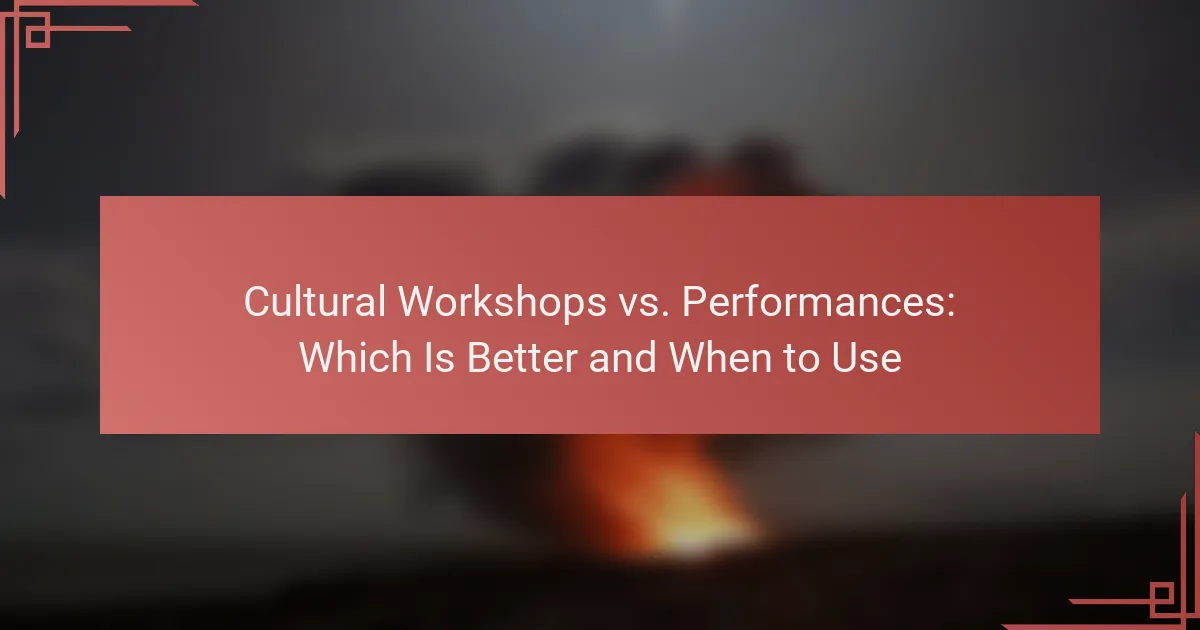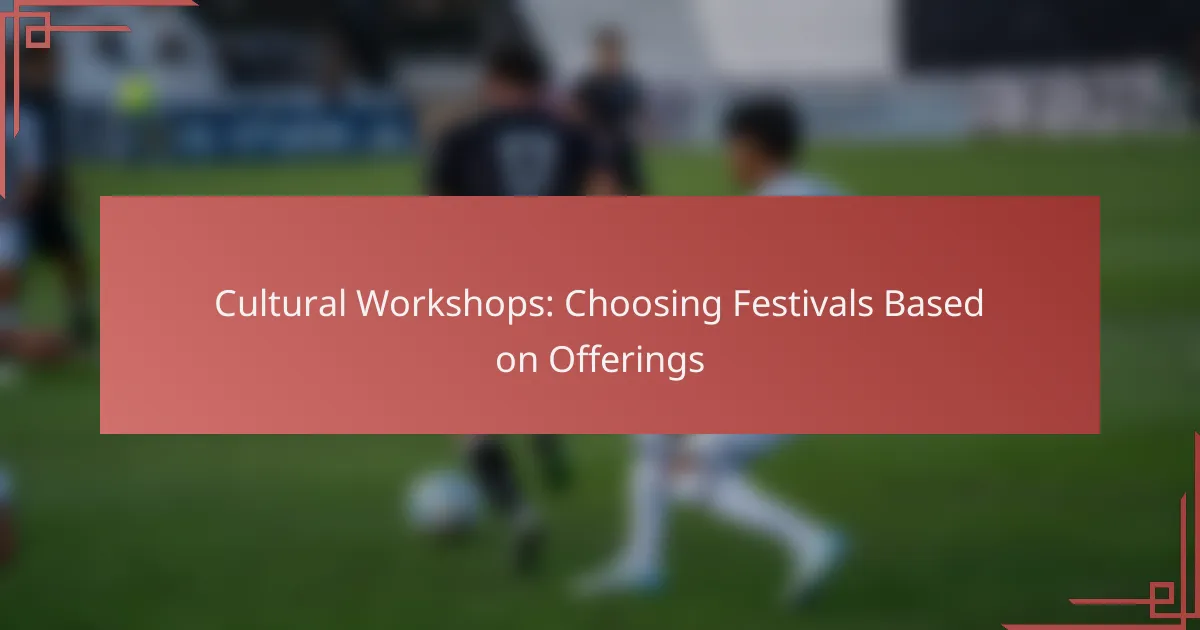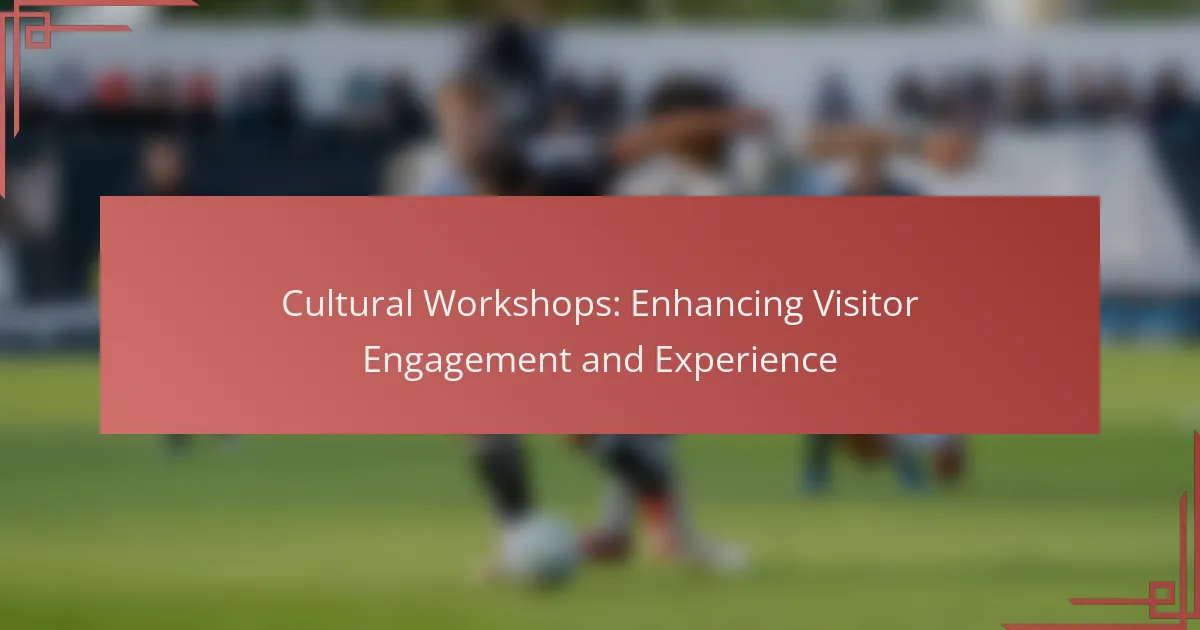When deciding between cultural workshops and performances, it’s essential to consider the goals and context of the event. Workshops facilitate hands-on learning and skill acquisition, allowing participants to engage directly with cultural practices. In contrast, performances offer an immersive experience that captivates audiences through dynamic storytelling and artistic expression, making them ideal for entertainment-focused events.
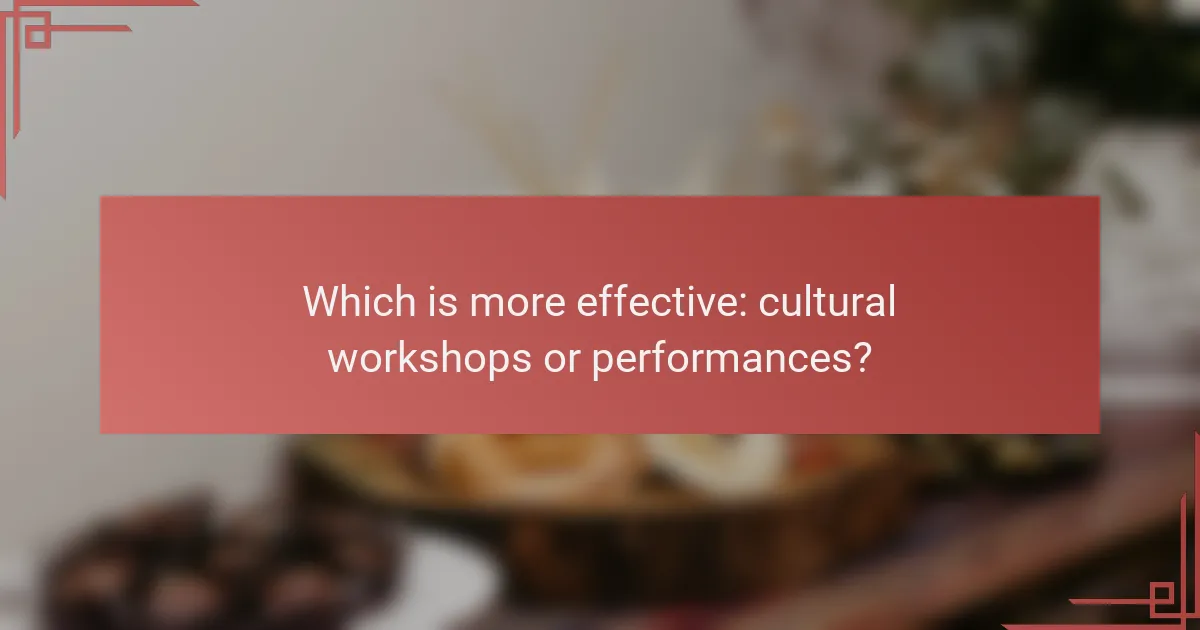
Which is more effective: cultural workshops or performances?
Cultural workshops are often more effective for hands-on learning, while performances excel in providing immersive experiences. The choice between the two depends on the desired outcomes, audience engagement, and the context in which they are used.
Cultural workshops foster hands-on learning
Cultural workshops emphasize active participation, allowing individuals to engage directly with the material. Participants can learn skills such as traditional crafts, cooking, or dance, which fosters a deeper understanding of the culture.
Workshops typically last from a few hours to several days, depending on the complexity of the subject. They are ideal for educational settings, community events, or team-building activities, where practical skills and personal interaction are prioritized.
To maximize the effectiveness of a workshop, ensure that the instructor is knowledgeable and that materials are readily available. Avoid overcrowding to maintain an intimate learning environment, which enhances engagement.
Performances provide immersive experiences
Performances offer an engaging way to experience cultural expressions, such as music, dance, or theater. They create an emotional connection and allow audiences to witness the richness of a culture in a dynamic format.
Typically lasting from one hour to several hours, performances can be staged in various venues, from small community centers to large theaters. They are particularly effective for outreach events, festivals, or celebrations where entertainment and cultural appreciation are key.
To enhance the impact of a performance, consider the venue’s acoustics and seating arrangement. Ensure that the performance is accessible to diverse audiences, including those with disabilities, to maximize participation and enjoyment.
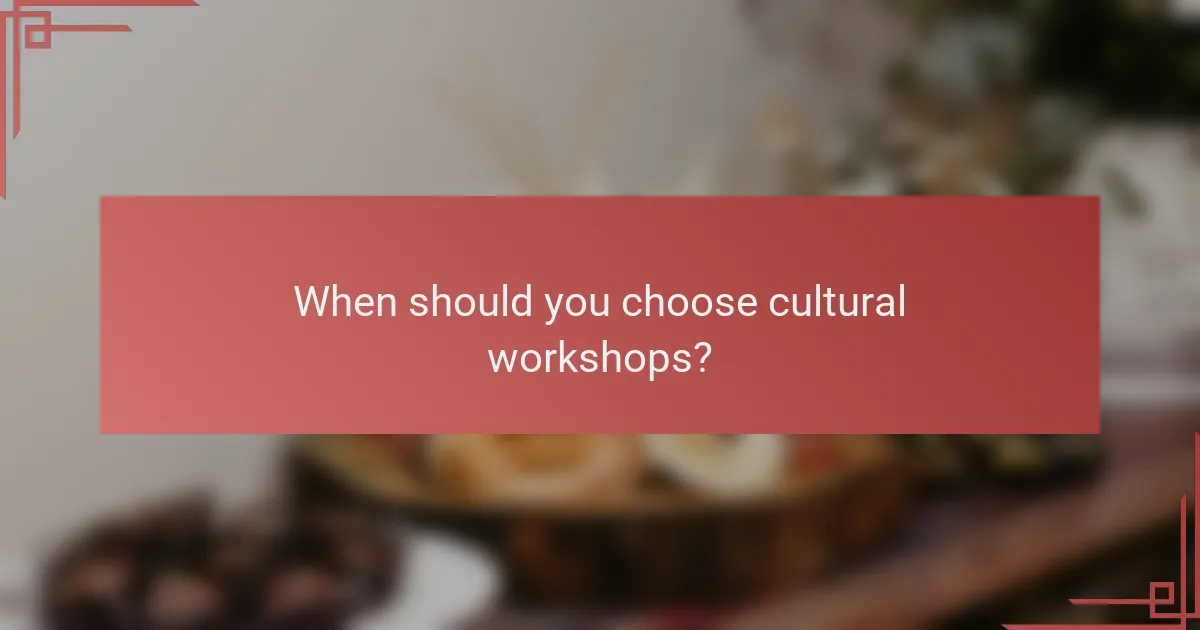
When should you choose cultural workshops?
Cultural workshops are ideal when you want to foster hands-on learning and skill acquisition. They provide participants with the opportunity to engage directly with cultural practices, enhancing understanding and appreciation through active involvement.
Ideal for skill development
Cultural workshops focus on teaching specific skills related to a culture, such as traditional crafts, cooking techniques, or dance forms. Participants can expect to gain practical knowledge and hands-on experience, which is often more effective than passive observation.
For example, a pottery workshop might allow participants to create their own pieces, while a cooking class could teach them to prepare authentic dishes. These experiences not only build skills but also instill a sense of accomplishment and connection to the culture.
Best for community engagement
Cultural workshops serve as a platform for community interaction, bringing people together to share experiences and learn from one another. They can foster a sense of belonging and promote cultural exchange among diverse groups.
Consider organizing workshops in local community centers or schools to maximize participation. Engaging local artists or cultural leaders as instructors can enhance authenticity and encourage deeper connections within the community.
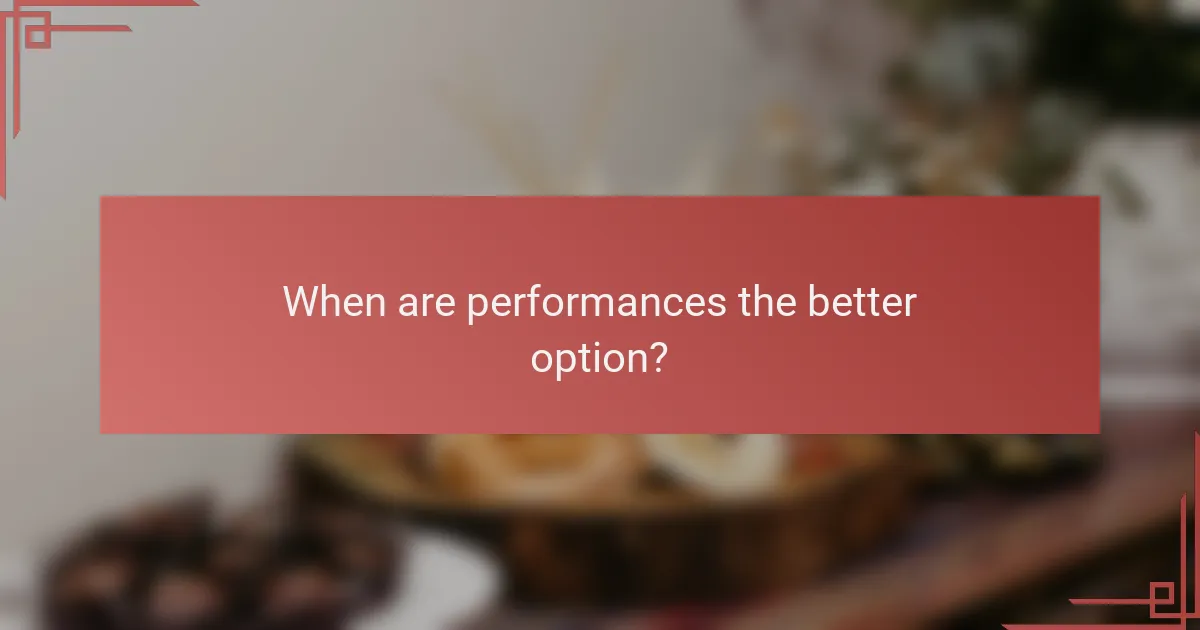
When are performances the better option?
Performances are often the better choice when the goal is to captivate an audience and create an immersive experience. They provide dynamic engagement through live action, music, and storytelling, making them ideal for events that prioritize entertainment and cultural expression.
Great for entertainment and engagement
Performances excel in creating a lively atmosphere that draws in audiences. They can include elements like dance, theater, and music, which actively involve participants and keep their attention. For instance, a live dance performance can energize a crowd, making it a memorable experience.
When planning an event, consider the audience’s preferences and the type of engagement you want to achieve. If the goal is to entertain, performances can be more effective than static workshops, as they evoke emotions and foster a shared experience among attendees.
Suitable for showcasing cultural heritage
Performances serve as a powerful medium for expressing and preserving cultural heritage. They allow for the demonstration of traditional practices, stories, and art forms that might otherwise be overlooked in a workshop setting. For example, a traditional music concert can highlight the unique sounds and rhythms of a culture.
When showcasing cultural heritage, consider incorporating performances that reflect the community’s history and values. This approach not only educates the audience but also fosters appreciation and respect for diverse cultural backgrounds. Engaging local artists can further enhance authenticity and connection to the culture being presented.

What are the costs associated with workshops and performances?
The costs associated with workshops and performances can vary significantly based on factors like venue, materials, and production quality. Generally, workshops tend to have lower upfront costs compared to performances, which may require more extensive resources and planning.
Workshops typically have lower upfront costs
Workshops often require minimal investment, focusing primarily on materials and venue rental. For instance, a community center might charge a few hundred dollars for a space, while materials can range from low-cost supplies to more expensive items, depending on the subject matter.
Additionally, facilitators or instructors may charge lower fees for workshops compared to performers. This makes workshops an accessible option for organizations with limited budgets looking to engage participants in hands-on learning experiences.
Performances may require higher production budgets
Performances usually involve higher costs due to the need for elaborate staging, technical equipment, and skilled performers. A theater production, for example, may necessitate a budget in the thousands of dollars for lighting, sound, and set design, alongside actor fees.
Moreover, ticket sales may not always cover these expenses, leading to potential financial risks. Organizations should consider the target audience and expected turnout when planning performances to ensure they can manage these higher production costs effectively.

How do cultural workshops and performances impact local communities?
Cultural workshops and performances significantly influence local communities by fostering skills development and enhancing economic activity. Workshops provide hands-on learning experiences, while performances attract visitors, creating a vibrant cultural scene that benefits residents and businesses alike.
Workshops enhance local skills and knowledge
Cultural workshops are designed to teach specific skills, such as traditional crafts, cooking, or music. These sessions often involve local artisans or experts, allowing participants to gain practical knowledge and preserve cultural heritage. For example, a pottery workshop led by a local potter not only teaches techniques but also promotes the community’s artistic traditions.
By engaging in workshops, community members can improve their employability and entrepreneurial skills. This can lead to the establishment of small businesses, such as artisan shops or food stalls, which contribute to the local economy. Communities should consider offering workshops that reflect their unique cultural identity to maximize participation and interest.
Performances boost local tourism and economy
Cultural performances, including music, dance, and theater, serve as major attractions for tourists, driving foot traffic to local businesses. Events like festivals or seasonal performances can draw large crowds, significantly increasing revenue for hotels, restaurants, and shops. For instance, a local folk dance festival can attract visitors from neighboring regions, enhancing the community’s visibility.
Moreover, performances create job opportunities in areas such as event management, hospitality, and the arts. Communities should strategically schedule performances during peak tourist seasons to maximize attendance and economic impact. Collaborating with local businesses for sponsorships can further enhance the financial viability of these events, ensuring a sustainable cultural ecosystem.

What are the prerequisites for hosting workshops and performances?
Hosting workshops and performances requires different prerequisites that cater to their unique formats. Workshops typically need skilled facilitators who can engage participants, while performances demand appropriate venues and equipment to ensure a successful presentation.
Workshops need skilled facilitators
Effective workshops depend on facilitators with expertise in the subject matter and strong communication skills. These individuals should be capable of guiding discussions, managing group dynamics, and adapting to participants’ needs. Consider having a facilitator with experience in adult education or group facilitation.
When planning a workshop, ensure the facilitator is familiar with the content and can create an interactive environment. This may involve preparing activities, discussion prompts, and feedback mechanisms to enhance learning. Avoid underestimating the importance of a skilled facilitator, as their ability to engage participants can significantly impact the workshop’s success.
Performances require venue and equipment
Successful performances necessitate a suitable venue equipped with the necessary technology and space. Factors to consider include seating capacity, acoustics, lighting, and stage setup. A venue that aligns with the performance’s theme can enhance the audience’s experience.
Additionally, ensure that all technical equipment, such as sound systems and lighting rigs, is available and functional. It’s advisable to conduct a technical rehearsal to troubleshoot any issues before the actual performance. This preparation helps avoid common pitfalls, such as poor sound quality or inadequate lighting, which can detract from the audience’s enjoyment.

What are the emerging trends in cultural workshops and performances?
Emerging trends in cultural workshops and performances highlight a shift towards more interactive and accessible experiences. As technology evolves, both formats are adapting to meet the changing preferences of audiences, with virtual options becoming increasingly prevalent.
Virtual workshops are gaining popularity
Virtual workshops have surged in popularity due to their convenience and accessibility. Participants can join from anywhere, eliminating travel costs and allowing for a broader audience reach. This format often includes interactive elements like breakout rooms and live Q&A sessions, enhancing engagement.
When planning a virtual workshop, consider using platforms that support multimedia sharing and real-time collaboration. Tools like Zoom or Microsoft Teams are commonly used, but ensure they fit your audience’s technical capabilities. Offering recordings can also help those who cannot attend live sessions.
However, be mindful of potential pitfalls such as technical difficulties or participant fatigue from prolonged screen time. Keep sessions concise, ideally under two hours, and incorporate breaks to maintain energy and focus. Engaging content and interactive activities are key to a successful virtual experience.
